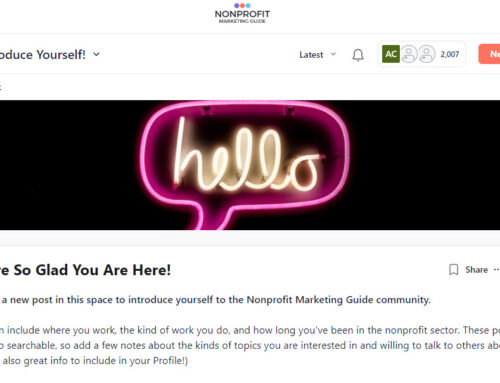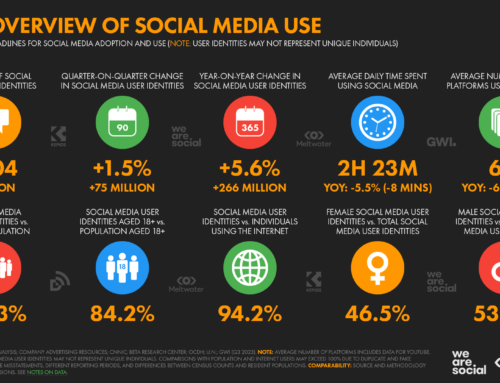I read “Trust Agents” by Chris Brogan and Julien Smith this weekend. It’s about, as the subtitle says, “Using the Web to Build Influence, Improve Reputation, and Earn Trust.”
I’m talking about these concepts in the book I’m writing on nonprofit marketing, so I wanted to see how what Chris and Julien advocate for the business community might translate to the nonprofit world. While they use Beth Kanter as an example of the “Archimedes Principle” — leveraging your network — that’s really the only mention of our sector.
I would sum up the basic thesis of the book as “Be there, be helpful, don’t ask for anything, and eventually it will pay off.” It’s essentially a guide for how to be human through your computer or nice guys finish first in social media. There is actually a section titled “The Importance of Being Human” and an “Action” list for how to be human that includes things like “Remember to ask about other people-first” and “If you mess up, remember the three A’s: acknowledge, apologize, act.” In another section they give advice on making eye contact and smiling at in-person events. Though they claim that “the nerd is mostly extinct,” a lot of the book feels like “Chris and Julien’s Advice for the Socially Inept.”
But, of course, the reality is that a lot of people and businesses are trying to use social media as their own personal hype machines, and therefore they aren’t acting like good human beings and end up turning off a lot of people. So, I understand the emphasis on netiquette in the book, especially in regards to social media, even though those weren’t my favorite sections.
Here’s what I think nonprofits will find most useful in “Trust Agents” . . .
Make Your Own Game. They suggest that you look at your situation as a game, and find ways to hack it. Don’t be afraid to try new approaches. I like this concept a lot, even though I’m not a gamer and many of their computer gaming examples went right by me. But this is the same idea I’m getting at when I tell nonprofits that they need to become their own media moguls and stop wasting tons of time trying to get press coverage. You can be the publisher and broadcaster now. Making your own game is how you stand out, which is really the core message behind Nonprofit Marketing Guide: helping your nonprofit stand out in the crowd. That’s one of our slogans. I think the game metaphor is another great way to get this concept across. This is really a must-do in today’s nonprofit marketing and fundraising environment.
Online Friends are Not “Move Your Couch” Friends. I know many nonprofits are struggling with understanding who and what their new online friends are to them. I’m still working on my book chapters on this, so I’m not sure how I will end up framing this exactly, but the way that Chris and Julien put it is that a friend online is not a sales (or fundraising) prospect. Just because you are now friends on Facebook doesn’t mean that a fundraising appeal will be welcome. Becoming a friend online means that person is now open to a conversation with you, but because you are being human (see above), asking for money is not what you want those early conversations to be about. Instead, you want them to be about learning about each other’s interests, being helpful, etc. If people in your organization are really having a hard time knowing what to do with your online friends, this book can definitely help.
Be “One of Us.” Along with the game metaphor, I also like this concept a lot. Chris and Julien are saying that you really have to see yourself as and behave as a member of the community you are trying to reach. You do that primarily by being helpful to others and not expecting anything in return. They also talk about being “Agent Zero,” where you build this network of networks around you and about “Building an Army” around you of people who you empower to help you.
When nonprofits try new approaches like social media, it’s often easier to convince skeptics of the value if you can relate those new approaches to your current job description or an element already in your strategic plan. If that’s the case with you, then the Agent Zero and Build an Army chapters will be particularly helpful to you, because they most closely align with what nonprofits do all the time — building networks of supporters around the cause and rallying volunteers and advocates to make it happen. But at the same time, caution Chris and Julien, never forget to remain “one of us.” No matter how much influence and trust you eventually weild online, you want to remain one of the guys.
Adopt a “Yes, and . . .” Mentality. It’s very easy for nonprofits to adopt a defensive posture and to fear competitive voices. After all, if that other group down the street gets more attention, then they might raise more money, perhaps money that you think is rightfully yours. I find that nonprofits also tend to dwell on the negative possibilities too much, especially related to using social media. You hear “Yes, but . . .” a whole lot. Chris and Julien advocate that you instead adopt a “Yes, and . . .” approach. Instead of getting stuck on the negatives, move the conversation forward with a new contribution.
“Trust Agents” is a very quick read, and while you’ll need to do some translating to the nonprofit world, if you are interested in how your nonprofit can use social media over the long-term to stand out and to build support for your cause by becoming a trusted voice in your community, it’s worth checking out.






